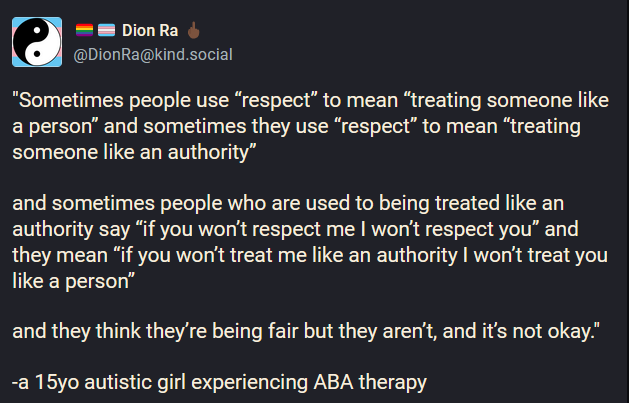Purpose
I have been doing some thinking on how the social world works, and wrote down my thoughts to help organize them. I am sharing them here in case anyone can help me build on them, find any issues, or benefit from these observations and conceptualizations. I think that building on this will help us understand our lives better and can also contribute to developing a culture that is more accepting and inclusive of our neurotype, so here it goes.
Intro
Having autism is a set up to live in an unreliable and chaotic social world that can become threatening at any moment and to define yourself as unworthy of attention, inclusion, and love. This is based on the well-established phenomenon that we do not understand NT cues and implications, so we miss out on a lot of their communication. This results with NTs making meaning out of our behaviors and statements that we absolutely did not mean or foresee, which leads to misinterpretations on both sides.
To help convey my ideas, Yippee will be the name of a hypothetical autistic person in the following examples.
Example 1
In the first example, an NT could take offense to something Yippee said innocently and pridefully of their authenticity even after assessing for all of the possible ways the statement could be offensive or rude. This is likely to happen in a situation where the NT is asking something indirectly, while Yippee only understands the direct question. It will not be until much later, even days to years, that Yippee will realize the true intention of the question. Let’s say someone creates a PowerPoint presentation and runs it by Yippee. The NT would ask at the end what Yippee thought of it. However, it is possible that the NT is actually saying, “Tell me this is good so I can feel confident.” What Yippee heard was, “How can we make this better?” What could follow is Yippee pointing out all the issues they saw with it, and Yippee would be doing so to demonstrate how hard they focused and thought about it because that costs them mental energy and they are spending it on the NT. Yippee is telling them how much they care about the NT’s production. What the NT experienced was that rather than make them feel confident, Yippee made them feel worse! Yippee did the exact opposite of what the NT was requesting. Naturally, the NT will be offended, which will cause them to be upset with Yippee. Yippee would then feel offended that their efforts were not only dismissed, but attacked out of nowhere.
Example 2
It can also happen in situations where the NT will take Yippee’s statement to be overly nice as if Yippee were trying to establish a closer relationship. For example, Yippee may notice that an acquaintance changed their hair and looks nice. Trying to be comforting and complimentary, Yippee tells them, “Your hair looks nice!” What Yippee thought was occurring was that the NT went out of their way to change their appearance, which Yippee understands has high value in society, and Yippee was trying to help them feel comfortable with the change. What the NT might have understood was that Yippee was trying to flirt. If the NT is not interested in Yippee romantically, they might feel uncomfortable and start distancing themself. If the NT is interested, they might start making attempts to flirt back with Yippee. Yippee likely will not pick up on those, so the NT may feel tricked or rejected. If Yippee does happen to pick up on them, then Yippee might feel confused because Yippee did not think they flirted with the NT. Yippee could even feel uncomfortable enough to distance themself from the NT, which would be confusing and insulting from the NT’s perspective. Regardless of the intentions, the social interaction that started out as innocent and caring turns into a displeasure for both sides.
The situation for Yippee could even get worse if the NT starts telling other people, some of which have likely had similar experiences with Yippee, that Yippee is a meanie. They start validating each other, so they do their NT thing and establish a truth based on social construction. If everyone believes it, it is true. Yippee the Caring is now deemed to be Yippee the Meanie.
For the NT, these interactions with an autistic person like Yippee are rare and odd interactions with a person they might see as a meanie. Yet, to Yippee this is a regular experience. This was another interaction in a lifelong set of interactions that go sour out of seemingly nowhere. As such, Yippee may have developed a view of the social world as being unpredictable, unreliable, and dangerous.
This can result in further exacerbating Yippee’s difficulties. As an autistic person, they may need the support of NTs. However, it may take Yippee a long time to attach because they are constantly waiting for the relationship to go bad at any moment without warning. They may even see that people are generally mean and manipulative. It can also result in Yippee being mute in new social settings or social groups that meet infrequently because they don’t want to speak since they don’t know what will be seen as rude or offensive, further limiting Yippe’s ability to make social connections.
Abuse
Here comes a potential dark side of this. With a lifelong history of Yippee being told they are careless and rude, of course Yippee would integrate some of that into who they believe they are. Additionally, since relationships could flip out of nowhere, Yippee doesn’t feel valued or worthy. Yippee feels like more of a utility or placeholder. This then can lead to even further damaging social patterns to obtain greatly desired social connection, such as people-pleasing, placing more effort into relationships than others, and tolerating mistreatment. These patterns make Yippee more vulnerable to predatory abusers that have learned to capitalize on individuals by strategically attacking their vulnerabilities and relentlessly benefiting from their efforts to counteract perceived failings. Relationships with these predatory abusers tend to make matters much worse as they work toward isolating their victims to have complete control over them. If the autistic person is capable of escaping that, they may still be torn apart socially and decide that the social world is just too dangerous, doomed to live a life of social isolation unless there is some very deep mental work completed along with professional and social support.
Tentative Conclusion
The above examples illustrate how different social expectations based on neurotype can lead to harmful outcomes. I argue that these outcomes would not have been as likely should the interactions had taken place between two NTs or two autistics. It still could have, but less likely. Therefore, one of the factors that we could consider when improving social interactions is to consider ways in which we can help develop understanding of each others neurotypically-based cultural differences. As far as what the autistic person can do is to find places that are safe for them. Once there, the autistic could mask less and let people know their neurotype so that others know to be aware of cultural differences. Other autistics can also identify themselves and be a source of inclusion, support, and dvocacy. NTs can help by becoming educated in autistic culture, using direct language, clarifying in odd situations, and educating and encouraging other NTs to do the same. Unfortunately, autistic people will have considerable limitations with doing the same for NT culture because they are physically incapable of doing so, just like many NTs will have a lot of difficulty with developing special interests, being brutally authentic, or avoiding small talk. Still, if we find where we can work to come together, we can work to make things better for both groups.
Author's Note
I think the tentative conclusion is that part that needs the most work. Knowing myself, I will be obsessively thinking about this for a few weeks, so I might have updates. In the meantime, I would welcome any helpful critiques, suggestions, or insights.


Depending on the details, either "holy fuck that'sbadman" or "holy fuck rich".